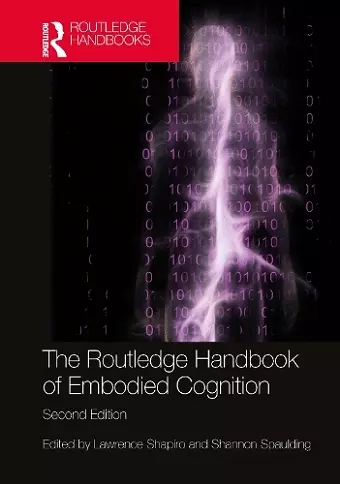The Routledge Handbook of Embodied Cognition
Lawrence Shapiro editor Shannon Spaulding editor
Format:Hardback
Publisher:Taylor & Francis Ltd
Published:28th Jun '24
£215.00
Supplier delay - available to order, but may take longer than usual.

Embodied cognition is one of the foremost areas of study and research in philosophy of mind, philosophy of psychology, and cognitive science. The Routledge Handbook of Embodied Cognition is an outstanding guide and reference source to the key topics and debates in this exciting subject and essential reading for any student and scholar of philosophy of mind and cognitive science.
Extensively revised and enlarged for this second edition, the Handbook comprises 42 chapters by an international team of expert contributors and is divided into ten parts:
- Historical Underpinnings
- Perspectives on Embodied Cognition
- Embodied Cognition and Predictive Processing
- Perception
- Language
- Reasoning and Education
- Virtual Reality
- Social and Moral Cognition and Emotion
- Action and Memory
- Reflections on Embodied Cognition
The early chapters of the Handbook cover empirical and philosophical foundations of embodied cognition, focusing on Gibsonian and phenomenological approaches. Subsequent chapters cover additional, important themes common to work in embodied cognition, including embedded, extended, and enactive cognition as well as chapters on empirical research in perception, language, reasoning, social and moral cognition, emotion, consciousness, memory, and learning and development.
For the second edition many existing chapters have been revised and seven new chapters added on: AI and robotics, predictive processing, second-language learning, animal cognition, sport psychology, sense of self, and critiques of embodied cognition, bringing the Handbook fully up to date with current research and debate.
Praise for the First Edition:
"With this collection of essays, written by active researchers based in the US and Europe, Shapiro provides an up-to-date description of the theory’s historical roots and philosophical underpinnings, along with supporting empirical evidence from human studies employing cognitive tasks and neuroimaging. … Given the fact that research in this area cuts across multiple disciplines - including philosophy, psychology, neuroscience, linguistics, cognitive science, robotics, and artificial intelligence - and is rapidly expanding, this is a timely and important work for scholars. … Summing Up: Highly recommended." - K. G. Akers, CHOICE
"This excellent collection arrives at a most appropriate time in the history of cognitive science. The editor’s choice of topics and contributors is skillful, and remarkably - given how difficult these topics can become - the chapters will be accessible to specialists and non-specialists alike." - Gordon Bermant, University of Pennsylvania, USA
"This is an essential collection for researchers working in any area of cognitive science, and one that transitions embodied cognition from its position as a reactionary discipline to a research programme in its own right. I expect this volume will act as a springboard for exciting new directions in teaching and research."- Stefan Linquist, University of Guelph, Canada
"This Handbook is a landmark in the embodied cognition field. It stands as a singular introduction to the methods and commitments of embodied cognition across a wide array of topics, with original chapters by some of the most prominent philosophers, psychologists, and neuroscientists at work today." - Elliott Sober, University of Wisconsin-Madison, USA
"Unparalleled in its accessibility and breadth of coverage, this volume serves as a perfect introduction to embodied cognition while also being enormously useful to experts. It includes cutting-edge ideas, illuminating reviews of standard positions and theoretical controversies, and a plethora of specific applications across the gamut of cognition, though always with an eye on the big picture." - Dan Ryder, University of British Columbia - Okanagan, Canada
Praise for the First Edition:
"With this collection of essays, written by active researchers based in the US and Europe, Shapiro provides an up-to-date description of the theory’s historical roots and philosophical underpinnings, along with supporting empirical evidence from human studies employing cognitive tasks and neuroimaging. … Given the fact that research in this area cuts across multiple disciplines - including philosophy, psychology, neuroscience, linguistics, cognitive science, robotics, and artificial intelligence - and is rapidly expanding, this is a timely and important work for scholars. … Summing Up: Highly recommended." - K. G. Akers, CHOICE
"This excellent collection arrives at a most appropriate time in the history of cognitive science. The editor’s choice of topics and contributors is skillful, and remarkably - given how difficult these topics can become - the chapters will be accessible to specialists and non-specialists alike." - Gordon Bermant, University of Pennsylvania, USA
"This is an essential collection for researchers working in any area of cognitive science, and one that transitions embodied cognition from its position as a reactionary discipline to a research programme in its own right. I expect this volume will act as a springboard for exciting new directions in teaching and research."- Stefan Linquist, University of Guelph, Canada
"This Handbook is a landmark in the embodied cognition field. It stands as a singular introduction to the methods and commitments of embodied cognition across a wide array of topics, with original chapters by some of the most prominent philosophers, psychologists, and neuroscientists at work today." - Elliott Sober, University of Wisconsin-Madison, USA
"Unparalleled in its accessibility and breadth of coverage, this volume serves as a perfect introduction to embodied cognition while also being enormously useful to experts. It includes cutting-edge ideas, illuminating reviews of standard positions and theoretical controversies, and a plethora of specific applications across the gamut of cognition, though always with an eye on the big picture." - Dan Ryder, University of British Columbia - Okanagan, Canada
ISBN: 9781032345123
Dimensions: unknown
Weight: 1200g
540 pages
2nd edition